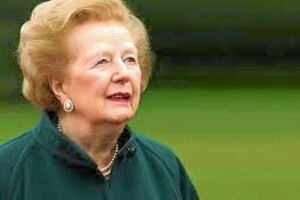TV review: Margaret Thatcher: Prime Minister
Never in the annals of TV rescheduling have so many programmes replaced planned viewing on a Monday night.

All the hurriedly rearranged scripts acknowledged the passing of our first (and only) woman Prime Minister who died peacefully in her final home, the Ritz Hotel. I find something immeasurably sad about that location.
The afternoon was packed with the news of it all, by teatime, we had gone over the iconic Margaret Thatcher moments time and again and heard former furious union members express their opinions, rivalled by others who believed she had changed the face of Britain for the better.
Channel 5 hurriedly slotted in an early evening look at the life and times of the Baroness with Margaret Thatcher: A Tribute, before BBC1's heavyweight 8.30pm to 10pm spot, Margaret Thatcher: Prime Minister.
While ITV came in with its late evening biggie as Alistair Stewart presented Margaret Thatcher: The Woman who changed Britain.
Even the greatest fans or detractors must have felt they had overdosed big time.
Against that barrage of Thatcherism, for and against, how did the BBC do with its tribute?
Her opener "I can't bear to see Britain in decline," continued with the enthusiastic claim that we 'rescued' half Europe.
That little emporium where she was brought up in Grantham, is surely the most photographed corner grocery shop in the country and where she learned her economic trade.
Daughter Carol, confirmed that all her extraordinary mother took into her career had been gleaned from that childhood experience – underwritten by her own shopkeeper father Alfred, also a Tory Alderman and one time mayor.
Even wars were not allowed to interfere with her life. The teenage Margaret did her homework under the kitchen table during Nazi raids, for example ?
A chemist, a barrister, a fledgling MP and by then, loving wife of Denis and mother to twins Mark and Carol, Carol believes that her father demanded nothing 'so allowing my mother to devote herself to the job 24 hours a day.'
Once in Westminster, for Finchley, she was not slow in making her mark as one of just 25 women out of more than 630 Members of Parliament.
A modern working women who 'was superwoman before superwoman was invented' – Carol again – Mrs Thatcher became the only woman in Ted Heath's Cabinet. He appointed her as Education Secretary, thinking she would never rise any further.
Around the same time, she said – 'I don't think there will be a woman Prime Minister in my political lifetime.'
It was an extraordinary achievement when she beat Edward Heath for the leadership of the Tory party and suddenly, was in line for Prime Minister.
Some of the most wimpish – including those who finally betrayed her – drifted wearingly into view last night still looking for their place in the sun.
While former Labour leader Neil Kinnock labelled Mrs Thatcher as being fortunate in her enemies and blamed Arthur Scargill for crumbling. Distance lending enchantment to the view, Neil? And surely that IRA bomb attack which killed friends and colleagues was hardly fortunate?
The programme also said sweetly that when beaten 'Ted Heath slunk off into the longest sulk in history.' Ouch! .
Her 'moneyterism' centred round the family shopping basket and she saw the sale of state-owned industries and council housing, as giving more people a stake in their own nation. She also took up with a poll tax which as Kenneth Clarke says, probably led to her defeat.
Now she has gone. But history as well as many thousands of words suggest that tributes and antagonism will linger on. Probably in equal measure.
Shirley Tart




